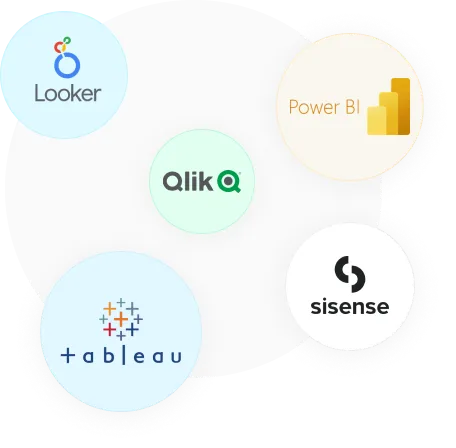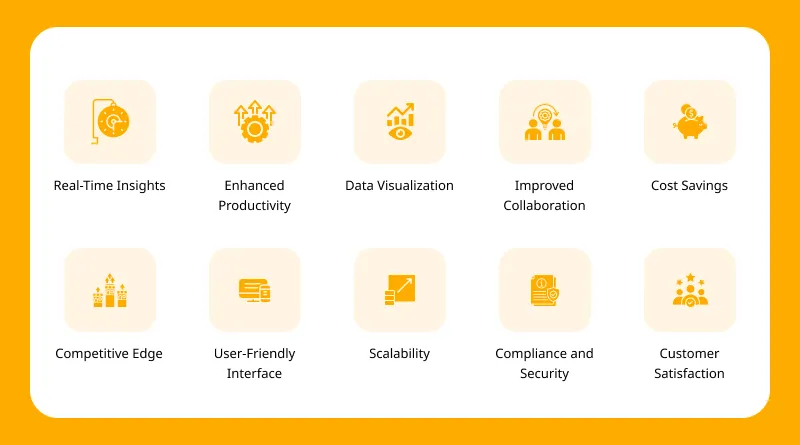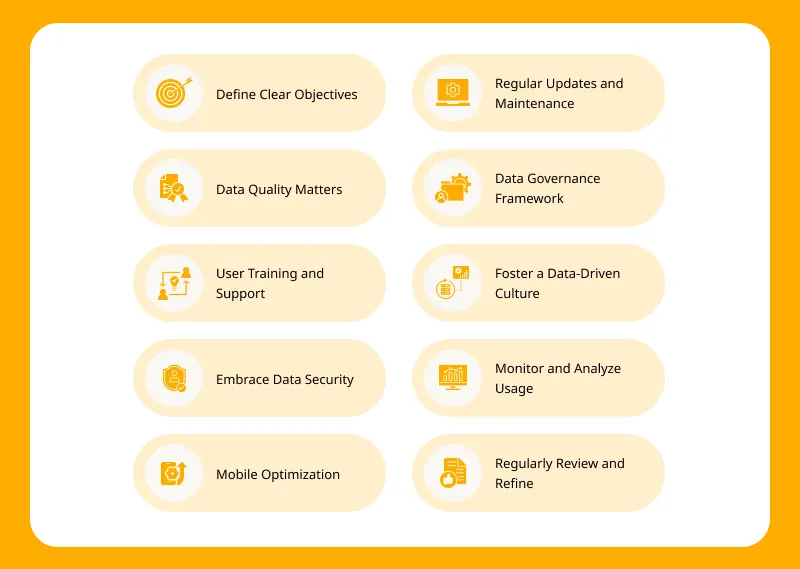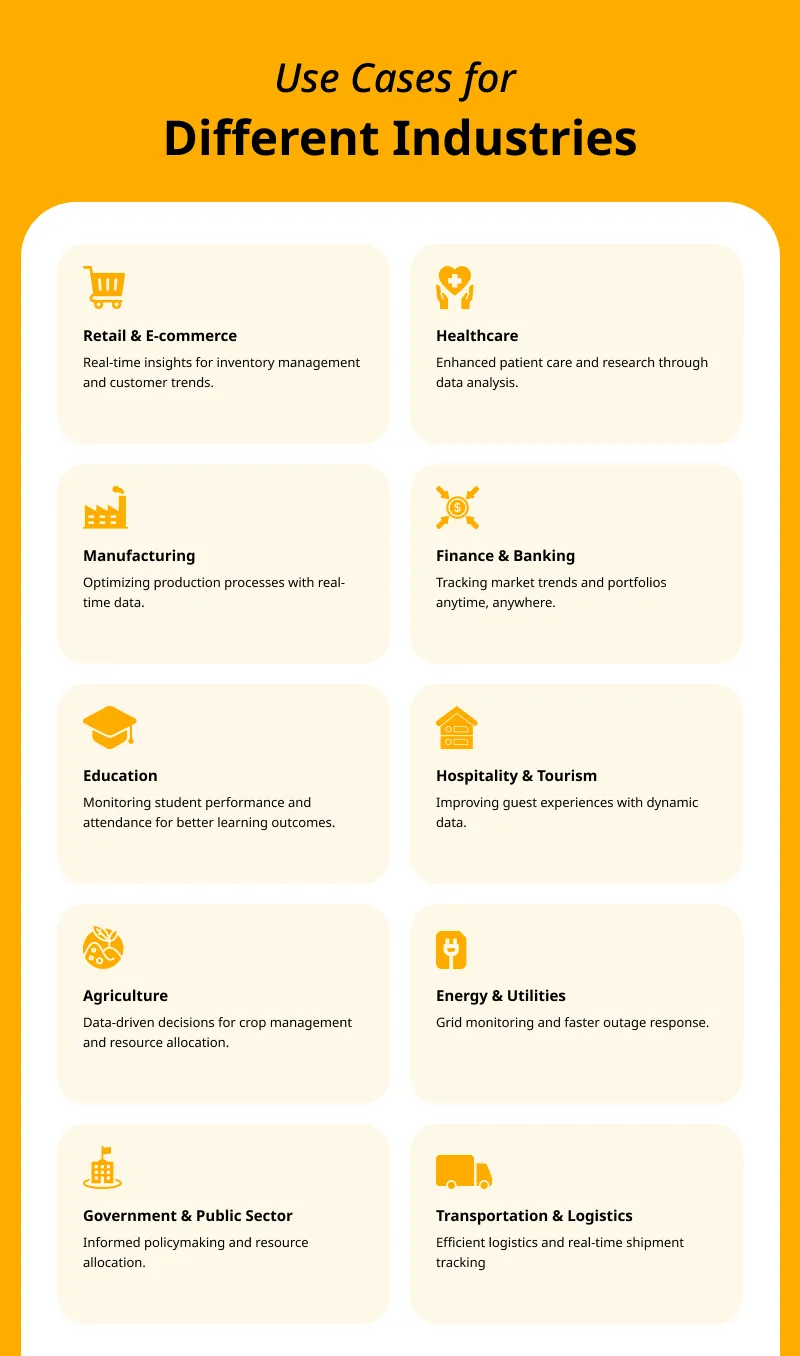How often do you check your smartphone in a day? Probably more times than you can count. Now, imagine if your smartphone not only connects you to the world but also becomes your business advisor.
Mobile BI solutions are revolutionizing our decisions. According to the “Business Intelligence [BI] Market Size & Share | Outlook, 2030″ report by Fortune Business Insights, revenue from business intelligence is forecast to reach USD 29.42 billion in 2023 and is projected to grow to USD 54.27 billion by 2030. Additionally, the report states that the market for mobile business intelligence may be worth $28.86 billion by 2027.
In this blog post about mobile Business Intelligence mastery, we’ll explore the top tools reshaping industries, their incredible benefits, and the best practices to ensure your data stays secure and actionable. Whether you’re a data enthusiast or a business leader, join us as we dive deep into the future of mobile BI solutions.
Top Mobile BI Tools
Selecting the right Business Intelligence tools when mastering mobile BI is your first strategic move. Let’s delve into some of the top contenders:
Power BI
As one of the frontrunners in mobile BI solutions, Power BI packs a punch with its user-friendly interface and robust capabilities. It empowers you to create stunning visuals, share reports seamlessly, and access your data from anywhere. Microsoft’s dedication to updates ensures that Power BI is always at the edge of BI technology.
Tableau Mobile
Tableau is renowned for its handheld data visualization prowess, and Tableau mobile doesn’t disappoint. It extends your analytical reach, allowing you to explore insights on your tablet or smartphone. With real-time data access, you’re always aware of critical business decisions.
QlikView
QlikView takes mobile BI solutions to the next level with its associative data model. It enables you to explore data relationships effortlessly, providing a deeper understanding of your business. Whether you’re in the office or on the go, QlikView ensures your data is just a tap away.
Sisense
Sisense stands out for its simplicity and agility. It’s designed for non-technical users, making mobile BI advantages accessible to everyone in your organization. You can transform complex data into actionable insights on your mobile device with a single click.
Looker
Looker’s mobile app is all about staying connected with your data. It offers a user-friendly experience, ensuring that even complex queries are easily handled. The ability to schedule data deliveries keeps you informed in real-time.
Choose your Mobile BI companion for informed decision-making!
These mobile BI solutions cater to different needs and preferences. However, they all share a common goal: to empower you with the portable BI insights necessary for informed decision-making.
As we journey deeper into mobile BI, keep these tools in mind—they might just be the compass you need to navigate the data-driven future.
Benefits of Mobile BI
In the age of on-the-go business, the benefits of mobile BI solutions are akin to having a secret weapon in your arsenal. They go beyond mere convenience; they reshape how you operate, decision by decision. Here’s a deeper look into the treasure trove of advantages:
Real-Time Insights:
Mobile BI app excellence provides immediate access to your data, ensuring that decision-makers always have the most current information at their disposal. Whether you’re monitoring sales figures, tracking inventory, or analyzing customer behavior, real-time insights enable you to respond swiftly to changing circumstances and make informed choices at the moment.
Enhanced Productivity:
BI through mobile app development services save your workforce from the constraints of the office environment. Field sales representatives can access customer data. Executives can review performance metrics during business trips, and remote teams can collaborate seamlessly. This accessibility fosters greater productivity and flexibility across the organization.
Data Visualization:
When unlocking mobile BI potential, the power of data visualization cannot be overstated. Mobile BI tools transform raw data into interactive dashboards, graphs, and easily interpreted charts. This visual representation simplifies complex data, allowing users to spot trends, anomalies, and opportunities at a glance without requiring extensive data analysis skills.
Improved Collaboration:
Mobile BI solutions facilitate collaboration by enabling team members to share real-time insights, reports, and analyses. Remote employees can collaborate on projects, conduct joint data reviews, and contribute to data-driven decision-making, regardless of geographical barriers. This fosters a culture of knowledge-sharing and teamwork.
Also Read: The Top Mobile App Development Companies To Watch In 2023
Cost Savings:
Mobile BI on-the-go expertise can help identify cost-saving opportunities within your organization. You can reduce operational expenses by uncovering inefficiencies, optimizing resource allocation, and pinpointing areas of potential waste. Additionally, mobile Business Intelligence tools assist in targeting high-value customers and revenue streams, ultimately contributing to cost-effectiveness.
Competitive Edge:
In today’s competitive business landscape, staying ahead is paramount. Mobile BI empowers you to make proactive decisions, seize emerging market trends, and capitalize on opportunities swiftly. Maintain a competitive edge in your industry by staying agile and responsive.
User-Friendly Interface:
Mobile BI solutions prioritize user-friendliness. Their intuitive interfaces require minimal training, ensuring users across various departments and skill levels can harness the tools effectively. This democratization of data access empowers a broader range of employees to make data-driven decisions.
Experience the benefits of mobile BI with ValueCoders
Scalability:
Mobile Business Intelligence consulting services accommodate your organization’s growth. They can seamlessly handle increased data volumes, complex analytics, and expanding user bases without compromising performance. This scalability ensures that your BI system remains effective as your business evolves.
Compliance and Security:
Data security and compliance are non-negotiable in today’s regulatory environment. Mobile BI solutions incorporate robust security measures, including audit trails, data encryption, and access controls, to protect confidential information and ensure compliance with industry regulations.
Customer Satisfaction:
Mobile or smartphone BI mastery empowers you to gain insights into customer behavior and preferences. You can create products, services, and marketing campaigns customized to their specific needs by analyzing customer data. This personalized approach enhances customer satisfaction, fosters loyalty, and drives revenue growth.
The mobile BI advantages are a roadmap to success in the data-driven world. They empower you to make informed decisions, drive efficiency, and gain a competitive edge—all from the palm of your hand. As we explore further, you’ll discover the best practices to harness these benefits fully.
Best Practices for Mobile BI Solutions
To harness the full power of mobile BI solutions, following best practices that ensure effective implementation and usage is essential. Here, we delve deeper into these best practices to guide you on your journey to mobile Business Intelligence mastery:
Define Clear Objectives:
Before diving into AI-powered mobile app development, establish precise goals and objectives. Consider what specific insights or key performance indicators (KPIs) you want to track and improve. Whether optimizing sales, reducing operational costs, or enhancing customer satisfaction, clarity in your objectives is the first step toward effective mobile BI utilization.
Data Quality Matters:
The integrity of your data is the foundation of effective BI. Implement data quality measures, including data cleansing and validation, to ensure your information is accurate and reliable. Address issues such as duplicate records, missing values, and inconsistencies, which can lead to erroneous conclusions.
Also Read – The Future of Business Intelligence: What to Expect in the Coming Years
User Training and Support:
Mobile BI solutions may vary in complexity, but all users benefit from training and support. Offer comprehensive training programs to familiarize users with the Business Intelligence tools and their features. Create a support system to address questions, troubleshoot issues, and provide guidance. Well-trained and supported users are more likely to use mobile BI effectively.
Embrace Data Security:
Mobile BI often involves the handling of sensitive business data. Implement stringent data security measures to protect against unauthorized access, data breaches, and cyber threats. Regular security audits, encryption, and access controls are essential components of a robust security strategy.
Mobile Optimization:
Design your reports, dashboards, and data visualizations with mobile viewing in mind. Mobile screens have limited space, so prioritize displaying critical information succinctly. The use of responsive design techniques ensures a seamless and user-friendly experience across various devices and screen sizes.
Regular Updates and Maintenance:
Mobile Business Intelligence tools continually evolve, with updates and new features released regularly. Stay informed about these updates and incorporate them into your BI strategy.
Regularly maintain and fine-tune your BI system to ensure mobile analytics proficiency, optimal performance, data accuracy, and alignment with your evolving business needs.
Data Governance Framework:
Establish a data governance framework that defines roles, responsibilities, and data ownership within your organization. Clear governance ensures that data is managed consistently, adheres to regulatory compliance, and maintains data quality standards.
Foster a Data-Driven Culture:
Leadership is crucial to creating a data-driven culture. Executives and managers should lead by example, using data insights to inform decisions. Encourage employees at all levels to leverage data for their tasks and recognize and reward those who embrace data-driven practices.
Monitor and Analyze Usage:
Regularly monitor the usage of your mobile BI solutions. Keep track of user engagement, report adoption rates, and the most accessed insights. Partner with a data analytics services company to determine patterns, trends, and areas for further training or optimization.
Discover Best Practices with ValueCoders for Mobile BI Success
Regularly Review and Refine:
Mobile BI is an ongoing process. Regularly revisit your objectives and assess how well your mobile BI aligns with your evolving business goals. Reevaluate your data sources, metrics, and tools to ensure they stay effective and relevant as your organization grows and changes.
By delving deeper into these best practices, you can establish a robust framework for successfully implementing and utilizing mobile BI solutions within your organization. This approach ensures that you not only harness the power of data but also adapt and grow in an ever-evolving business landscape.
Use Cases for Different Industries
Mobile BI on-the-go expertise is a versatile tool that can revolutionize decision-making across various industries. Let’s explore how these solutions are making a substantial impact on multiple sectors:
Retail and E-commerce:
Mobile BI enables retailers to monitor real-time sales trends, inventory levels, and customer behavior. Store managers can access performance dashboards on their smartphones, optimizing inventory management and ensuring products are readily available to meet customer demands.
Healthcare:
Mobile BI solutions enhance patient care and operational efficiency in the healthcare sector. Physicians and healthcare administrators can access patient data, track treatment outcomes, and manage resources on mobile devices. Mobile BI also aids in analyzing clinical data for research and treatment improvements.
Manufacturing:
Manufacturers rely on mobile BI and Manufacturing Data Analytics to monitor production lines, supply chain logistics, and equipment performance. Production managers can identify bottlenecks and make quick adjustments to optimize production processes by accessing real-time data on mobile devices
Also Read: Choosing The Right BI Tools: A Comprehensive Guide For Businesses
Finance and Banking:
Financial institutions use mobile portable BI insights to track market trends, manage portfolios, and provide clients with up-to-date financial insights. Mobile access to financial data allows bankers and investors to make informed decisions regardless of location.
Education:
In the education sector, mobile BI helps educators and administrators track student performance, monitor attendance, and analyze educational outcomes. Teachers can access student progress data, enabling timely interventions to support individual learning needs.
Hospitality and Tourism:
In the hospitality industry, mobile BI assists hotel managers in optimizing room occupancy, pricing strategies, and guest satisfaction. Real-time data on mobile devices helps hotels adapt quickly to changing demand and improve the guest experience.
Agriculture:
Mobile BI solutions are valuable for farmers and agribusinesses. They can access weather data, market trends, and crop performance analytics on mobile devices. This empowers them to make data-driven decisions about planting, harvesting, and resource allocation.
Energy and Utilities:
Mobile BI aids energy companies in monitoring grid performance, energy consumption patterns, and equipment maintenance. Field engineers and technicians can access critical data on mobile devices, enabling faster response to outages and maintenance needs.
Government and Public Sector:
Governments use mobile BI to analyze public services, infrastructure, and citizen feedback data. This data-driven approach helps policymakers make informed decisions to improve service delivery and allocate resources efficiently.
Explore Diverse Use Cases with ValueCoders
Transportation and Logistics:
In the transportation and logistics sector, mobile BI solutions provide real-time tracking of shipments, route optimization, and vehicle performance monitoring. This ensures efficient delivery processes and cost-effective logistics management.
Case Study: Business Intelligence Solution For a Leading Airport
At ValueCoders, we understand the transformative power of mobile BI app excellence across industries. We recently collaborated with the authorities of a leading airport and successfully addressed the complex challenges through a transformative Business Intelligence Solution.
By leveraging the power of data analytics and real-time reporting, we provided the airport and airline authorities with valuable insights into passenger flow, flight statuses, and operational efficiency. This case study serves as a testament to our expertise in delivering tailored BI solutions that enhance the performance and customer experience in the travel industry.
Conclusion
In a world where data reigns supreme, mobile Business Intelligence mastery is your compass to success. From top tools that empower you to harness the power of data on the go to the myriad benefits that enhance productivity and decision-making and best practices that pave the way for seamless implementation—mobile BI solutions are the key.
So, embrace the future with confidence. Let mobile BI be your ally in unlocking actionable insights, regardless of your industry. Whether you’re in healthcare, finance, education, or any other sector, smartphone BI mastery is a journey toward a more informed, efficient, and competitive future. Your data-driven destiny awaits—seize it with mobile BI at your side.









